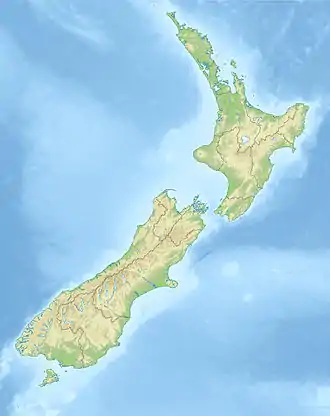1901 Cheviot earthquake
The 1901 Cheviot earthquake occurred at 07:47 NZT on 16 November 1901 (20:15 15 November UTC)[1] with an estimated magnitude of 6.9, centred near the township of Cheviot in the Canterbury region of New Zealand.
 | |
| UTC time | 1901-11-15 20:15 |
|---|---|
| ISC event | 16957744 |
| USGS-ANSS | n/a |
| Local date | 16 November 1901 |
| Local time | 07:47 NZT |
| Magnitude | 6.9 |
| Depth | 33 km |
| Areas affected | South Island, New Zealand |
| Casualties | 1 death |
Damage and casualties

A baby was killed when a sod hut collapsed.[2] Other casualties in the Canterbury region are not known.
The ChristChurch Cathedral experienced some damage in this earthquake. The top of the spire fell again as a result of the 16 November 1901 Cheviot earthquake. This time, the stone construction was replaced with a more resilient structure of Australian hardwood sheathed with weathered copper sheeting, with an internal mass damper.
Observations of sand blows (sand volcano) and lateral spreading, consistent with soil liquefaction phenomena in the township of Kaiapoi were reported in local newspapers in a two to three block area at the eastern end of Charles and Sewell Streets on the north bank of the Kaiapoi River, in addition to similar effects observed on the opposing river bank, and the road to Belfast.[3]
References
| Wikimedia Commons has media related to 1901 Cheviot earthquake. |
- "Catalog of Damaging Earthquakes in the World (Through 2013)". IISEE. Retrieved 14 May 2019.
- This Week in History, GNS Science, archived from the original on 19 August 2010
- Berrill, J.B.; Mulqueen, P.C.; Ooi E.T.C. (1994). "Liquefaction at Kaiapoi in the 1901 Cheviot, New Zealand, Earthquake". Bulletin of the New Zealand National Society of Earthquake Engineering. 27: 178–189.
External links
- "School interior after earthquake (photo)". Otago Witness. 27 November 1901.
- "McTaggart's shop (photo of front)". Otago Witness. 27 November 1901.
- "McTaggart's shop (photo of back)". Otago Witness. 27 November 1901.
- "Cartoon: Who are you?". Observer. 30 November 1901.
- "Cartoon: Hon Hall-Jones contemplating the ruins". Observer. 30 November 1901.
- "Cartoon: Another injustice to Auckland by Dick Seddon!". Observer. 23 November 1901.